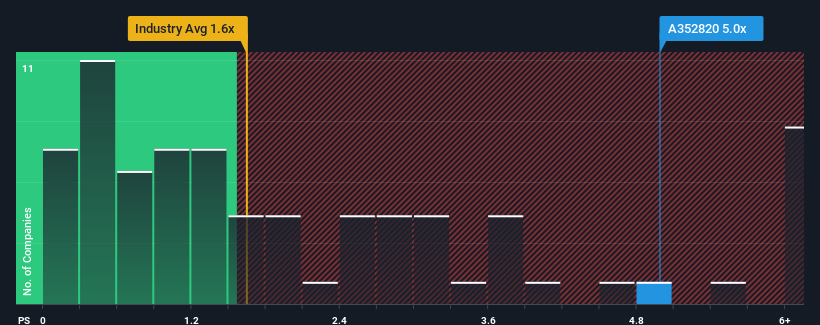- South Korea
- /
- Entertainment
- /
- KOSE:A352820
Why Investors Shouldn't Be Surprised By HYBE Co., Ltd.'s (KRX:352820) 26% Share Price Surge
HYBE Co., Ltd. (KRX:352820) shares have had a really impressive month, gaining 26% after a shaky period beforehand. The last 30 days bring the annual gain to a very sharp 35%.
After such a large jump in price, given around half the companies in Korea's Entertainment industry have price-to-sales ratios (or "P/S") below 1.6x, you may consider HYBE as a stock to avoid entirely with its 5x P/S ratio. However, the P/S might be quite high for a reason and it requires further investigation to determine if it's justified.
View our latest analysis for HYBE

What Does HYBE's Recent Performance Look Like?
With revenue growth that's inferior to most other companies of late, HYBE has been relatively sluggish. One possibility is that the P/S ratio is high because investors think this lacklustre revenue performance will improve markedly. If not, then existing shareholders may be very nervous about the viability of the share price.
Keen to find out how analysts think HYBE's future stacks up against the industry? In that case, our free report is a great place to start.How Is HYBE's Revenue Growth Trending?
The only time you'd be truly comfortable seeing a P/S as steep as HYBE's is when the company's growth is on track to outshine the industry decidedly.
Taking a look back first, we see that the company managed to grow revenues by a handy 3.6% last year. Pleasingly, revenue has also lifted 80% in aggregate from three years ago, partly thanks to the last 12 months of growth. Accordingly, shareholders would have definitely welcomed those medium-term rates of revenue growth.
Shifting to the future, estimates from the analysts covering the company suggest revenue should grow by 16% per year over the next three years. Meanwhile, the rest of the industry is forecast to only expand by 12% each year, which is noticeably less attractive.
With this in mind, it's not hard to understand why HYBE's P/S is high relative to its industry peers. It seems most investors are expecting this strong future growth and are willing to pay more for the stock.
What Does HYBE's P/S Mean For Investors?
The strong share price surge has lead to HYBE's P/S soaring as well. While the price-to-sales ratio shouldn't be the defining factor in whether you buy a stock or not, it's quite a capable barometer of revenue expectations.
Our look into HYBE shows that its P/S ratio remains high on the merit of its strong future revenues. At this stage investors feel the potential for a deterioration in revenues is quite remote, justifying the elevated P/S ratio. Unless the analysts have really missed the mark, these strong revenue forecasts should keep the share price buoyant.
It's always necessary to consider the ever-present spectre of investment risk. We've identified 2 warning signs with HYBE, and understanding these should be part of your investment process.
If these risks are making you reconsider your opinion on HYBE, explore our interactive list of high quality stocks to get an idea of what else is out there.
Valuation is complex, but we're here to simplify it.
Discover if HYBE might be undervalued or overvalued with our detailed analysis, featuring fair value estimates, potential risks, dividends, insider trades, and its financial condition.
Access Free AnalysisHave feedback on this article? Concerned about the content? Get in touch with us directly. Alternatively, email editorial-team (at) simplywallst.com.
This article by Simply Wall St is general in nature. We provide commentary based on historical data and analyst forecasts only using an unbiased methodology and our articles are not intended to be financial advice. It does not constitute a recommendation to buy or sell any stock, and does not take account of your objectives, or your financial situation. We aim to bring you long-term focused analysis driven by fundamental data. Note that our analysis may not factor in the latest price-sensitive company announcements or qualitative material. Simply Wall St has no position in any stocks mentioned.
About KOSE:A352820
HYBE
Engages in the music production, publishing, and artist development and management businesses.
Flawless balance sheet with reasonable growth potential.
Market Insights
Community Narratives



